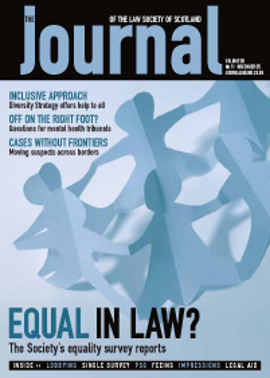A need undiminished

This year marks the 30th anniversary of the founding of the Scottish Legal Action Group (Scolag). The second issue of the Group’s Bulletin, published in December 1975, asked whether devolution will “lead to more frequent and more informed discussion of present laws and proposed reforms”. In a separate article in the same issue, reporting on a talk by Professor Bradley at the AGM of the Scottish Council for Civil Liberties, warrant sales and mental health legislation were referred to as among the areas requiring reform; it was also suggested that the proposed Scottish Assembly should be required to observe the ECHR and that the Scottish courts be given jurisdiction over such matters. It has taken the best part of 30 years for these reforms to be made, but now that they have come to pass, is it time for Scolag to shut up shop? Not a chance.
The legal system remains as much of a mystery for people nowadays as it was 30 years ago. Unless or until they get caught up in an actual civil or criminal case, most people’s understanding of the law comes from TV entertainment or media coverage of problems and scandal. Although recent changes have brought improvements, their experiences as witnesses or jurors can still leave them without any real understanding of what has been going on. Nor has devolution yet delivered to us a full set of politicians who give the appearance of being that much better informed. It has not helped that some of the worst examples of questionable personal conduct have been provided by lawyers turned politicians. On top of this the quality of drafting of some legislation can at times drive those responsible for implementing it to despair.
Devolution is however an engine for change, and there are still underlying problems which need to be addressed. I’m a firm believer in the view that knowledge is power, and that the best way to empower people is to provide them with the information they require to take responsibility for and control over their lives, and the means to use that information. Failing that, they should at least be able to get assistance from someone else when they might need help. Thirty years ago the Group was promoting the work of neighbourhood law centres where qualified lawyers and the voluntary advice services could work in conjunction. The Group is still pressing for this to be adopted as a model for the delivery of legal services to communities throughout Scotland and not just the few urban areas currently served. This year we called for the teaching of the fundamentals of the civil and criminal justice systems, together with a framework which explains citizens’ principal social and legal rights and responsibilities. These might include consumer rights, housing rights, money advice, parental rights and responsibilities, parenting skills, and children’s rights. This is a matter we shall be pursuing further in the coming year.
In terms of practical areas of law which more directly impact on people’s everyday lives, the Group through its Journal continues to cover housing law and how tenants can secure their rights to decent habitable housing; employment law; family law; the children’s hearings system; social security law issues, and much more. Procedural reforms of the civil justice system, a review of legal aid, and an independent police complaints system are another three examples of “structural” issues which the Group was concerned with in 1975 and continues to be concerned with in 2005.
It would be nice to think that decisions were taken for the benefit of people and with a long-term, thought-out purpose. Many times I am left wondering whether the motivating factor behind proposed changes is nothing more than a desire to extract as much from the system for as little financial input as possible. More than once it has appeared that civil service administrative concerns are given precedence over those of people with practical experience of the legal system. Where public money is spent, those who receive it should be accountable and should provide value for money, but doing things on the cheap does not sit easily with providing a quality service. Consultation papers repeat the favourite stock phrases about involving communities, developing a sense of ownership in the system on the part of the public, working in partnership, increasing access to justice, but then set out a series of options or a favoured proposal which do nothing to further these principles, or actively work against them. I want to see a legal system that Scotland should be proud of, a legal system genuinely seen as a world leader in opening up access to justice for all members of society. There is still plenty of work for Scolag to do in order to fulfil that aspiration.
In this issue
- Changing perceptions
- A need undiminished
- Steps forward
- A better way to work
- Combatting the cross-border criminal
- Seen to be fair?
- The lobbying game
- A favoured model?
- A grand day out
- A window of opportunity
- Don't fall at the final hurdle
- Practice guideline: form of accounts and taxation
- Advice for All: the Society's response
- Matter for debate
- Divorcing the divorced
- Uncommon commencement dates
- Scottish Solicitors' Discipline Tribunal
- Website review
- Book reviews
- Still thumbs down
- Search and copy fees changing
- Common currency






